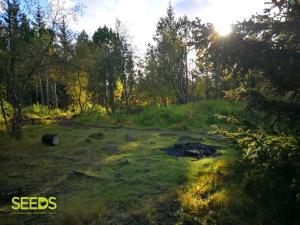SEEDS 047. Environmentally Aware & Trash Hunting
Breakdown:
- Accommodation and food: 220.00 Euro
- Transportation: 20.00 Euro
- Activities: 60.00 Euro
- Hosting organisation support: 0 Euro

Description: The Environmentally Aware & Trash Hunting project is part of a series of camps organised by SEEDS in cooperation with different partners. SEEDS works with and supports the Icelandic ministry for Environment and Natural Resources on a project to clean up the Icelandic coastline; the Blue Army, an organisation dedicated to the cause of coast cleaning; Whales of Iceland, an exhibition of life size models of whales and porpoises aiming at educating about their lives and human impact on their existence; SORPA, the organisation in charge of waste collection & management in the Reykjavík area and other local stakeholders.
Type of Work: This camp allows volunteers to learn about global and local environmental issues through non-formal activities such as workshops, discussions, presentations and visits, as well as to contribute directly to environment protection by joining outdoor cleanup tasks.
These cleanup tasks may be arranged in partnership with the abovementioned organisations or organised solely by SEEDS. We aim to also involve the local community, so some of our events may be open to the public. We hope participants will learn how to plan and do their own trash hunting projects back at home. This project is based on similar activities around the world, where outstanding results have been achieved with volunteers.
This camp combines learning, sharing, hands-on work and fun. No previous experience is needed.
Study Theme: One of the two options below is also included in this camp as a hands-on volunteering activity day:
- A day trip combining a visit to the Hellisheiði geothermal power plant, a trash hunt in the area; and the Hot River Hike, a hike up a valley filled with hot springs where one can bathe.
- A day trip to the Reykjanes peninsula, combined with a coastal cleanup in the area.
We may also visit the SORPA facilities and attend a lecture on waste management in Reykjavik. All the activities are dependent on conditions such as weather, pandemic-related restrictions and availability of our partners.
Accommodation: SEEDS participants will stay in a house in Reykjavík. The facilities are basic with a kitchen, showers, and a washing machine. Everyone is expected to show consideration for their companions. Participants will sleep in shared rooms or dormitories. Please bring your own sleeping bag.
Volunteers will receive food supplies and will be in charge of cooking and cleaning. Please note the food SEEDS provides will be vegetarian. Do not forget to bring some traditional/typical food, drinks, recipes, music, games or movies from your country for the intercultural evening.
Language: English will be the language in the camp; basic conversational skills are needed.
**Study theme: Volunteers should prepare to share environmental issues from their countries and be ready to spend time outdoors, walk medium distances during the cleanups, as during other activities and sightseeing.
Requirements: Participation fee EUR 300 (Euros). The fee can either be transferred in advance via bank transfer, or paid in cash on arrival. It includes transport from the meeting point to the camp (on the first day), other activities available; and one trip combined with the trash collection activity (Hot River or Reykjanes).
Approximate Location: Reykjavík is a dynamic, modern city which lives in harmony with nature, using renewable energy sources. The world’s northernmost capital bridges the Atlantic, between Europe and North America. Reykjavík is spread across a peninsula with a panoramic view of the mountains and the Atlantic. It is an international city with a lively cosmopolitan cultural scene surrounded by beautiful nature.
Notes: Other excursions (e.g. Golden Circle, the South Shore and/or Snæfellsnes) can be arranged at discount fares if there is additional free time after the camp workshops/sessions.
It may be cold and/or rainy, so we recommend bringing warm and waterproof clothes (underlayers, overcoats, scarves, gloves and hats) and good walking shoes, as some of the activities take place outdoors.
As a part of the project happens outdoors, volunteers should be ready to adapt and be flexible with the work and free-time schedule, as depending on the changeable weather, we may not be able to perform some of the activities (as) planned.
